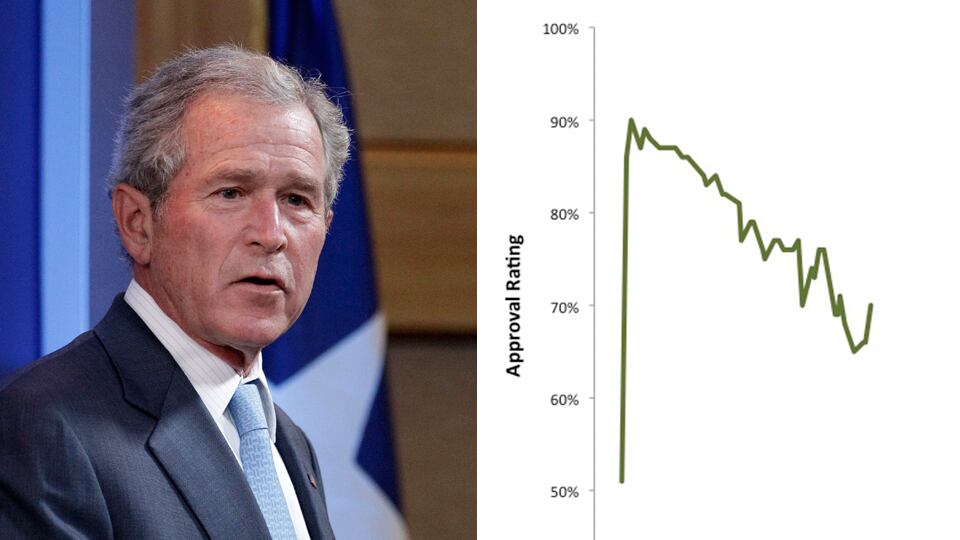
Highest approval rating: 90% (9/21/2001)
Corresponding event: September 11
Conflict was good for George W.’s popularity—his approval ratings spiked following the 9/11 attacks, the start of the Iraq War and Saddam Hussein’s capture. The largest surge came directly after the twin towers fell thanks to an overflow of patriotism, but dipped after concerns over the economy, tax cuts and judicial nominations captured national attention.

Highest approval rating: 69% (1/7/1949)
Corresponding event: Announces Fair Deal program
After highs during his initial days in office that were characterized by wartime wins, Truman’s popularity peaked early in 1949 following his State of the Union address that introduced his Fair Deal plan to ensure health insurance and equal rights to all Americans, as well as an increase in the minimum wage.

Highest approval rating: 89% (2/28/1991)
Corresponding event: Operation Desert Storm ends
The elder George Bush’s approval rating climbed nearly 20 points during the culmination of the conflict, but the boost was short-lived. Following a perceived inability to generate consensus among the parties, as well as raising taxes and rising unemployment, the spike dropped precipitously.

Highest approval rating: 58% (1/25/1980)
Corresponding event: Iran hostage crisis begins
His term started with high approval ratings, but averaged around just 45 percent during his time in office. He received a relative spike after the Iran hostage ordeal began, but the event, which dragged on for 444 days, including a failed rescue attempt, painted Carter as a hesitant leader.

Highest approval rating: 73% (12/19/1998)
Corresponding event: Impeachment by House of Representatives following Lewinsky affair
Not only did Clinton’s approval rating peak following his impeachment, but the number of Americans who disapproved of the Republican Party climbed 10 points. A third of the country approved of the House’s decision to impeach Clinton, about the same fraction that had a favorable view of the GOP overall.

Highest approval rating: 52% (6/27/1975)
Corresponding event: Establishes committee for 1976 presidential election
Largely disliked for his pardon of Nixon early in his oval office tenure, he received only minor bumps in his approval ratings before the 1974 midterm elections and once he announced he would run for president—which coincided with the fall of Saigon and the rescue of a U.S. merchant ship that was seized in Cambodia.

Highest approval rating: 83% (4/28/1961)
Corresponding event: Orders Bay of Pigs invasion
Though the attack proved to be disastrous, shortly after Kennedy accepted responsibility for the botched overthrow of Castro, his approval rating spiked. His popularity was consistently high, except for a dip surrounding Civil Rights legislation and the Birmingham bombing.

Highest approval rating: 68% (5/8/1981)
Corresponding event: Assassination attempt
Reagan’s “grace under fire” caused the public to generate new-found support for him, as well as his economic policies. The elevated approval rating is also credited with helping him to snag a broad-based re-election.

Highest approval rating: 79% (2/28/1964)
Corresponding event: Tax cut is enacted and Civil Rights Act passes House of Representatives
Johnson was riding a wave of popularity following Kennedy’s assassination in 1963. The wave peaked in the spring of 1964 after a tax cut (originally proposed by Kennedy) was enacted and Johnson quickly shepherded the Civil Rights Act from the House to the Senate.

Highest approval rating: 79% (12/14/1956)
Corresponding event: Suez Canal crisis begins
With one of the highest overall average approval ratings of 65 percent, Eisenhower earned a bump from his public denunciation of allies in the invasion of Eqypt. His involvement in the ordeal was later viewed as a huge mistake, even by the former president himself.

Highest approval rating: 67% (1/26/1973)
Corresponding event: Declares ceasefire in Vietnam
Despite notorious anti-war protests, support for Nixon’s policies rose during his presidency. The removal of military operations in Vietnam, Cambodia, and Laos in 1973 caused an ephemeral spike in approval ratings, which faded with rising inflation, the oil crisis, and the Watergate scandal.





